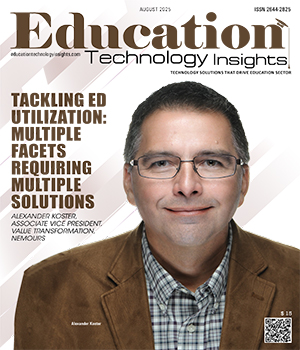THANK YOU FOR SUBSCRIBING
Be first to read the latest tech news, Industry Leader's Insights, and CIO interviews of medium and large enterprises exclusively from Education Technology Insights
Build Skills, Build Relationships, Build Communities
Jaimie Piotrowicz, Director of Social and Emotional Learning, The School District of Philadelphia
 Jaimie Piotrowicz, Director of Social and Emotional Learning, The School District of Philadelphia
Jaimie Piotrowicz, Director of Social and Emotional Learning, The School District of PhiladelphiaThe bombardment of adverse global events, COVID-19 lockdowns, deeply rooted social inequities, and an on-going pandemic have highlighted the seemingly insurmountable challenges that we social and emotional beings face across the globe. The tumultuous years we’re still overcoming have shifted the world in a way that has made adults and children feel more disconnected from themselves and each other than ever before. In a 2020 study, Wang, Zhang, Zhao, Zhan, and Jiang found that 48 percent of the population is experiencing stress problems and difficulties with emotional control. This is a jarring finding despite its predictability and enduring societal normalization. We regularly witness and read about the impacts of high stress and emotional powerlessness on our fellow citizens and communities. As we exist in this new and almost-urgent state, social and emotional learning (SEL)—or social-emotional learning—and relationship building are critical to shifting into a new realm of intrapersonal well-being, interpersonal connectedness, and community transformation.
You may ask yourself, “Why or how would relationships and social and emotional skills help me cope with current affairs?" How can relationships change what is happening in our world? Why not retreat to an island of my own creation and doom spiral? While anxiety and fear emotions may prompt feelings of hopelessness or even a desire to cope through isolation, interpersonal connections, or relationships with others, “create an environment in which [we] feel competent, independent, and akin to others, which increases motivation” (Thijssen, Rege, and Solheim, 2022). When we consider the global issues our students will face in adulthood, we cannot ignore the simple truth that the future lies in their hands. They cannot develop themselves, improve the state of the world, impact communities, or challenge social injustices without building relationships. As educators of children, we cannot support our youth in their own relationship building without intentionally creating safe, healthy environments for learning and fostering relationships with our students.
Schools, classrooms, and other formal and informal learning environments present unique opportunities to instruct and support our youth in developing their relationship-building competencies. The most crucial skill our students can learn is empathy. As said by astrophysicist Neil deGrasse Tyson, “Part of our formal education should be training in empathy. Imagine how different the world would be if, in fact, it were ‘reading, writing, arithmetic, and empathy.” How different would the world be? What would our communities look like if members were more empathetic to others and themselves?
Our youth need us to help, guide, and explicitly teach them empathy and social and emotional skills that are vital to their ability to understand themselves and their values, develop healthy confidence, assume responsibility for their words and actions, appreciate how others’ experiences differ from their own, and forge productive relationships with others. Intrapersonal well-being, interpersonal connectedness, and community development depend on our youth members’ abilities to develop and continually strengthen relationships—the children are our future. “Teach them well and let them lead the way,” as famously sung by George Benson and the late, great Whitney Houston and written by Linda Creed.
“As educators of children, we cannot support our youth in their own relationship building without intentionally creating safe, healthy environments for learning and fostering relationships with our students.”
Community meetings are a high-impact practice in social-emotional learning and relationship building through which we can integrate and explicitly teach these skills. Whether you call it a community meeting, a morning meeting, a daily meeting, or any other title, practicing social and emotional skills and learning about each other—to strengthen empathy and build relationships—is the purpose of this deliberate gathering. Inclusive community meetings help students construct and fortify their social and emotional skills and relationships. Gathering in this format provides a safe space for active skill development, such as active listening, healthy conflict, and non-judgment, and healthy expression, such as unique perspectives, individual representation, and self-advocacy. Students are more likely to feel empowered to handle unfamiliar and arbitrary situations by maintaining community meetings as a vital ritual. Building skills and relationships through intentional community meetings also equips students to solve problems and handle anomalous and haphazard situations.
Fostering self-development through regular community meetings as the trusted adult will lead your students through a robust education and could inspire future leaders. Global learning becomes more attainable even in a post-pandemic world by providing our youth with the tools to be more resilient, emotionally competent, empathetic, and collaborative individuals.
Read Also
Building an Understanding of AI in Learning Environments
Integrating SEL, Digital Citizenship, and AI Literacy in K–8 Schools
Preparing Students for More than their First Job
Moving Beyond Reaction to Proactive Student Engagement
Tech-Enabled, Human-Centered: Effective Student Support
Compassion That Shapes Student Success

I agree We use cookies on this website to enhance your user experience. By clicking any link on this page you are giving your consent for us to set cookies. More info





















